ETI基本守则
ETI基本守则
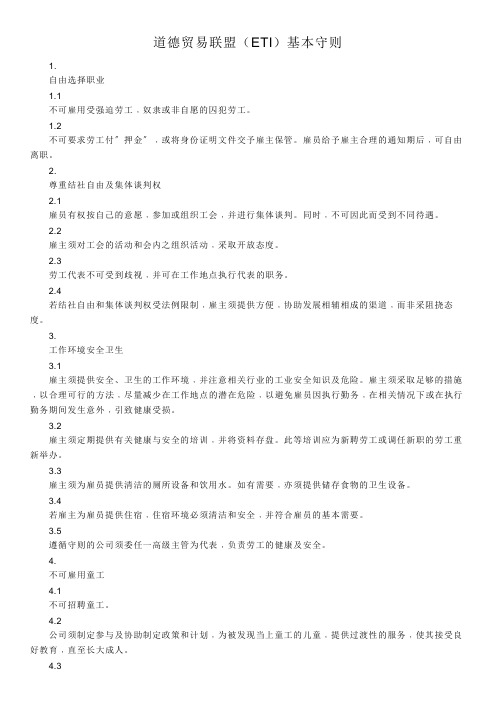
道德贸易联盟(ETI)基本守则1.自由选择职业1.1不可雇用受强迫劳工﹐奴隶或非自愿的囚犯劳工。
1.2不可要求劳工付〞押金〞﹐或将身份证明文件交予雇主保管。
雇员给予雇主合理的通知期后﹐可自由离职。
2.尊重结社自由及集体谈判权2.1雇员有权按自己的意愿﹐参加或组织工会﹐并进行集体谈判。
同时﹐不可因此而受到不同待遇。
2.2雇主须对工会的活动和会内之组织活动﹐采取开放态度。
2.3劳工代表不可受到歧视﹐并可在工作地点执行代表的职务。
2.4若结社自由和集体谈判权受法例限制﹐雇主须提供方便﹐协助发展相辅相成的渠道﹐而非采阻挠态度。
3.工作环境安全卫生3.1雇主须提供安全、卫生的工作环境﹐并注意相关行业的工业安全知识及危险。
雇主须采取足够的措施﹐以合理可行的方法﹐尽量减少在工作地点的潜在危险﹐以避免雇员因执行勤务﹐在相关情况下或在执行勤务期间发生意外﹐引致健康受损。
3.2雇主须定期提供有关健康与安全的培训﹐并将资料存盘。
此等培训应为新聘劳工或调任新职的劳工重新举办。
3.3雇主须为雇员提供清洁的厕所设备和饮用水。
如有需要﹐亦须提供储存食物的卫生设备。
3.4若雇主为雇员提供住宿﹐住宿环境必须清洁和安全﹐并符合雇员的基本需要。
3.5遵循守则的公司须委任一高级主管为代表﹐负责劳工的健康及安全。
4.不可雇用童工4.1不可招聘童工。
4.2公司须制定参与及协助制定政策和计划﹐为被发现当上童工的儿童﹐提供过渡性的服务﹐使其接受良好教育﹐直至长大成人。
4.3不可聘用十八岁以下儿童及青少年﹐在夜间或危险场所工作。
4.4上述政策及程序﹐须与国际劳工组织标准的相关条文一致。
5.基本生活工资5.1每个正常工作周的工资及福利﹐至少须达到当地的法定标准或业内的参考标准﹐并以较高者为主。
在任何情况下﹐雇员工资除应足以维持基本需求外﹐也应在此之上有所剩余﹐以供零用。
5.2所有雇员在入职前应获发书面通知﹐清楚说明有关工资的聘用条件﹐并在每次发薪时﹐收到有关支薪期内工资的书面说明。
ETI核心价值观(中英文)
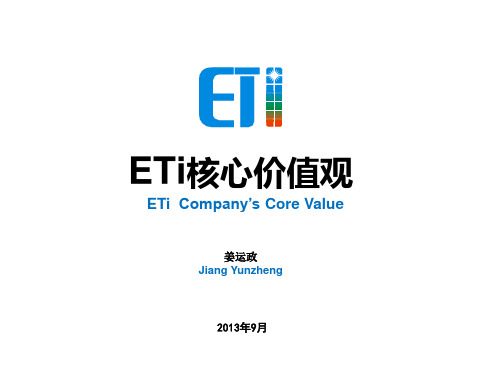
•
• 全球一流的技术创新者和受
人尊敬的全球化企业 (全球地位)
我们将实现企业员工、股东、客户和供应 商、公司所在的社区乃至社会各自追求价 值(让利益相关者分享公司成长的价值, 一流公司的共同特征)。 We will realize the
individual value of the employees, shareholders, customers, suppliers and the community where the company stays. ( It is the common characteristic of the first-class companies that making the beneficiaries share the value of company’s growth). 5
•
•
内容:公司优势是什么、产品与服务的价 值是什么、公司工作中什么是最有价值的。
Content: the company’s advantage, the value of the product and service, and the most valuable work of the company.
•
我们必须拥有领先的市场地位和持续的业 绩增长(愿景和目标实现的前提)。We
must take the lead of the market and keep outstanding performance continuously ( precondition of achievements of vision and goal).
• 全球小家电和LED照明领域最
优秀的整体解决方案提供商 (核心业务)
ETI认证的基本法规
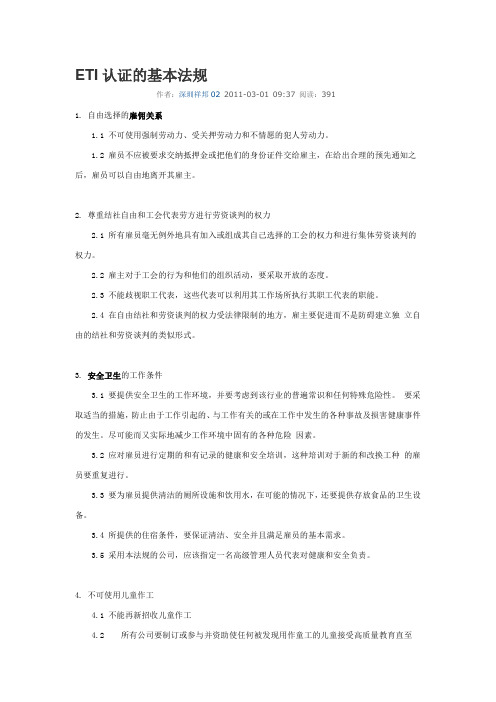
ETI认证的基本法规作者:深圳祥邦022011-03-01 09:37 阅读:3911. 自由选择的雇佣关系1.1 不可使用强制劳动力、受关押劳动力和不情愿的犯人劳动力。
1.2 雇员不应被要求交纳抵押金或把他们的身份证件交给雇主,在给出合理的预先通知之后,雇员可以自由地离开其雇主。
2. 尊重结社自由和工会代表劳方进行劳资谈判的权力2.1 所有雇员毫无例外地具有加入或组成其自己选择的工会的权力和进行集体劳资谈判的权力。
2.2 雇主对于工会的行为和他们的组织活动,要采取开放的态度。
2.3 不能歧视职工代表,这些代表可以利用其工作场所执行其职工代表的职能。
2.4 在自由结社和劳资谈判的权力受法律限制的地方,雇主要促进而不是防碍建立独立自由的结社和劳资谈判的类似形式。
3. 安全卫生的工作条件3.1 要提供安全卫生的工作环境,并要考虑到该行业的普遍常识和任何特殊危险性。
要采取适当的措施,防止由于工作引起的、与工作有关的或在工作中发生的各种事故及损害健康事件的发生。
尽可能而又实际地减少工作环境中固有的各种危险因素。
3.2 应对雇员进行定期的和有记录的健康和安全培训,这种培训对于新的和改换工种的雇员要重复进行。
3.3 要为雇员提供清洁的厕所设施和饮用水,在可能的情况下,还要提供存放食品的卫生设备。
3.4 所提供的住宿条件,要保证清洁、安全并且满足雇员的基本需求。
3.5 采用本法规的公司,应该指定一名高级管理人员代表对健康和安全负责。
4. 不可使用儿童作工4.1 不能再新招收儿童作工4.2 所有公司要制订或参与并资助使任何被发现用作童工的儿童接受高质量教育直至不再是儿童为止的政策和项目。
儿童和儿童作工的定义在附录中给出。
4.3 不可雇用儿童和18 岁以下青少年在夜间或在危险的条件下工作。
4.4 这些政策和程序必须与相关的 ILO 标准条款一致。
5. 维持生活的工资5.1 每个标准工资周所付的工资和福利,至少要达到国家的法定标准或行业规定的标准,以高者为准。
ieee的伦理指导原则

ieee的伦理指导原则
IEEE的伦理指导原则主要包括以下几个方面:
1.尊重伦理准则:IEEE成员应遵守最高的诚信和伦理标准,不得从事任何
违反伦理道德的行为。
2.保护知识产权:IEEE成员应尊重和保护他人的知识产权,包括专利、商
标、著作权等。
3.避免利益冲突:IEEE成员应避免与个人、组织或公司存在利益冲突,如
果存在冲突,应采取措施予以解决。
4.促进多样性、包容性和平等机会:IEEE成员应尊重多样性、包容性和平
等机会,不歧视任何个人、组织或公司。
5.保持公正和独立:IEEE成员在履行职责时应保持公正和独立,不受任何
不当影响。
6.遵守法律法规:IEEE成员应遵守相关法律法规,包括隐私法、反腐败法
等。
7.保持透明度:IEEE成员在工作中应保持透明度,充分披露相关信息,以
便他人了解和评估工作成果。
8.促进可持续发展:IEEE成员应关注环境保护、社会责任和可持续发展,
并将其纳入工作实践和研究中。
9.保持诚信和正直:IEEE成员应始终保持诚信和正直,不得从事任何欺诈、
虚假陈述或其他不诚实行为。
10.促进团队合作:IEEE成员应尊重他人的意见和贡献,积极参与团队合作,
共同推动技术的发展和应用。
这些原则旨在指导IEEE成员在工作中遵守基本的道德标准和行为规范,维护公共利益和行业声誉。
ETI行为准则(中英文版)19

• I LO Conventions 29 and 105 & Recommendation 35 (Forced and Bonded Labour)
• I LO Convention 87 (Freedom of Association)
• I LO Convention 98 (Right to Organise and Collective Bargaining)
of ratification, to respect, promote
and realise the principles contained in
the core ILO Conventions. These core Conventions and their accompanying Recommendations comprise:
Appendix A: Relevant international standards
Although not core ILO conventions, other ILO standards especially relevant to the work of ETI include:
• I LO Convention 138 & Recommendation 146 (Minimum Age).
ieee行为准则 -回复

ieee行为准则-回复IEEE行为准则是社会性和道德行为的指南,旨在引导工程技术人员遵守职业道德和行为规范。
这个准则对于确保工程技术人员在工作中具有高度的道德责任和职业素养至关重要。
本文将一步一步回答“IEEE行为准则”的问题。
1. 为什么要遵守IEEE行为准则?遵守IEEE行为准则有几个重要的原因。
首先,这项准则旨在确保工程技术人员在工作中以公正、诚实和负责任的方式行事,从而保持公共利益和社会福祉的最高标准。
其次,遵守准则可以增强公众对工程技术行业的信任,并加强职业团体的声誉。
此外,它还可以确保技术的正确应用和可行性,提高项目的质量和可靠性。
2. IEEE行为准则的基本原则是什么?IEEE行为准则的基本原则包括:(1) 公共利益:确保技术应用的最高标准,促进社会福祉和可持续发展。
(2) 客观性和独立性:坚持客观、诚实和独立的态度,不受利益冲突或不当影响的干扰。
(3) 守信:遵守承诺,不做虚假或误导性的宣传,确保对他人的诚实和尊重。
(4) 尊重他人:尊重他人的尊严、权利和财产,避免歧视、骚扰或不公平对待他人。
(5) 职业责任:担当起个人和团体的责任,提供教育和培训,促进工程技术的进步和知识共享。
3. IEEE行为准则的适用范围和目标是什么?IEEE行为准则适用于所有拥有或的工程技术人员。
其目标是确保工程技术人员在从事工作时遵守职业道德和行为规范。
准则涵盖了技术专业性、人际交往、个人责任和组织义务等方面。
4. IEEE如何保证成员遵守行为准则?IEEE会员在加入组织时必须同意遵守行为准则。
会员需要履行一份承诺,承诺遵守准则,并且在所从事的领域中确保公正和诚实。
此外,IEEE还设立了专门的道德和调查委员会,负责监督会员的行为,并根据需要进行调查和纪律处理。
5. 遇到违反IEEE行为准则的情况该怎么办?当遇到违反IEEE行为准则的情况时,可以通过以下方式解决问题:(1) 首先,可以与涉事人员进行私下交流,提出关于其行为的担忧,并希望他们能纠正错误。
ETI Principles of Implementation道德贸易倡议基本法规
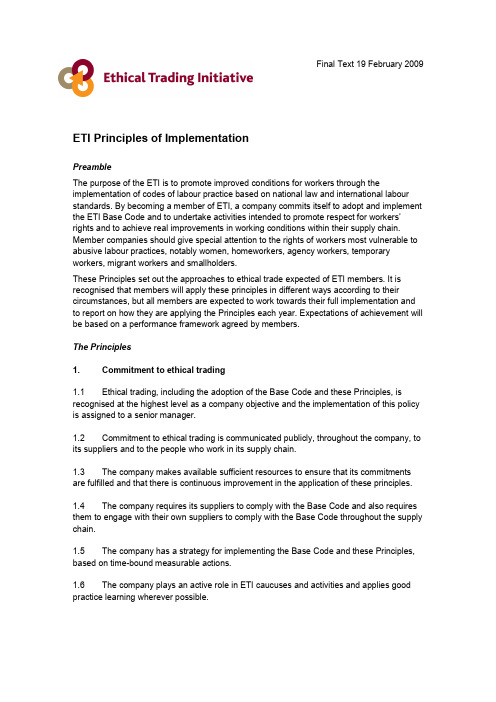
Final Text 19 February 2009ETI Principles of ImplementationPreambleThe purpose of the ETI is to promote improved conditions for workers through the implementation of codes of labour practice based on national law and international labour standards. By becoming a member of ETI, a company commits itself to adopt and implement the ETI Base Code and to undertake activities intended to promote respect for workers’ rights and to achieve real improvements in working conditions within their supply chain. Member companies should give special attention to the rights of workers most vulnerable to abusive labour practices, notably women, homeworkers, agency workers, temporary workers, migrant workers and smallholders.These Principles set out the approaches to ethical trade expected of ETI members. It is recognised that members will apply these principles in different ways according to their circumstances, but all members are expected to work towards their full implementation and to report on how they are applying the Principles each year. Expectations of achievement will be based on a performance framework agreed by members.The Principles1. Commitment to ethical trading1.1 Ethical trading, including the adoption of the Base Code and these Principles, is recognised at the highest level as a company objective and the implementation of this policy is assigned to a senior manager.1.2 Commitment to ethical trading is communicated publicly, throughout the company, to its suppliers and to the people who work in its supply chain.1.3 The company makes available sufficient resources to ensure that its commitments are fulfilled and that there is continuous improvement in the application of these principles. 1.4 The company requires its suppliers to comply with the Base Code and also requires them to engage with their own suppliers to comply with the Base Code throughout the supply chain.1.5 The company has a strategy for implementing the Base Code and these Principles, based on time-bound measurable actions.1.6 The company plays an active role in ETI caucuses and activities and applies good practice learning wherever possible.1.7 In undertaking ethical trade activities, the company works collaboratively with other ETI members and with other parties including suppliers affected by its activities.2. Integrating ethical trade into company culture and business practices2.1 The company selects suppliers with good labour practices that are likely to observe the provisions of the Base Code.2.2 The company recognises the contribution that stable business relationships can make to the observance of good labour practices and endeavours to establish long term relationships with its suppliers.2.3 The company ensures that the terms of agreements with its suppliers such as prices, lead times and quantities are consistent with the ability of the supplier to observe the provisions of the Base Code.2.4 Buying staff and other personnel whose decisions may affect working conditions and labour practices in the supply chain are made aware of the potential impact of such decisions. They are provided with training and guidelines that enable them to carry out company ethical trading policy and their performance is assessed and managed accordingly3. Capacity-building for suppliers and others3.1 The company provides information, guidance, training and support for its suppliers to observe the Base Code and to comply with any other policies on ethical trade required by the company of its suppliers.3.2 The company seeks the views of its suppliers over their ability to meet the Base Code given existing buying practices, and assists them to meet their concerns.3.3 The company ensures that all workers covered by the code, and their representatives, are aware of the provisions of the Base Code and of the commitments to ethical trade that it has made through its ETI membership.3.4 The company supports and encourages the development of effective management systems among its suppliers and mature systems of industrial relations that require full respect for freedom of association and collective bargaining.4. Identifying problems in the supply chain4.1 The company undertakes activities to be aware of the working conditions and labour practices in its supply chain in order to understand the nature and location of risks to ethical trade, uses this information and shares it with other members.4.2 The company gathers and analyses verifiable information about its suppliers’ performance on complying with the Base Code and uses this information to inform its sourcing decisions.4.3 The company ensures that mechanisms exist to enable workers in its supply chain to report confidentially and without detriment any failure to observe the Base Code and to deal with such complaints.5. Improvement actions5.1 The company works with its suppliers to rectify any problems identified and implement improvements that are consistent with the provisions of the Base Code.5.2 The company negotiates time-bound plans for improvements with suppliers and makes sure that the improvements are actually made.5.3 The company provides support and advice to help suppliers make agreed improvements.5.4 The Company recognises the fundamental importance of independent and democratic organisations of workers’ own choosing – commonly known as trade unions – in achieving sustainable improvements and encourages an open and positive attitude towards trade unions and collective bargaining because they are the essential elements of all mature systems of industrial relations.5.5 The company terminates supplier relationships where serious breaches of the Code persist only after reasonable attempts have been made to work with the supplier to implement improvements, and where there is no reasonable prospect of securing improvements. Such terminations should be carried out in a responsible way.5.6 The company works with suppliers, other ETI members and other parties affected by its activities to address the root causes of non-compliances through the design and implementation of activities which identify and test good practice and effective solutions.6. Transparency6.1 The company reports fairly and accurately on its ethical trade activities.6,2 The company complies with ETI reporting requirement.6.3 The company reports publicly, and in more detail as its experience grows, on its commitments to ETI, its ethical trade activities and impacts.6.4 The company encourages its suppliers to be transparent about their ethical trade performance.6.5 The company responds rapidly, fully and openly to any complaints about code violations in its supply chain.。
ETI 基本准则

基本准则1.自由选择的雇佣关系1.1 不可使用强制劳动力、受关押劳动力和非自愿的监狱劳动力。
1.2 工人不应被要求交纳抵押金或把他们的身份证件交给雇主,在给出合理的预先通知之后,工人可以自由地离开其雇主。
2.尊重结社自由和集体谈判的权利2.1 所有工人毫无例外地具有加入或组成其自己选择的工会的权利和进行集体谈判的权利。
2.2 雇主对于工会的行为和他们的组织活动,要采取开放的态度。
2.3 不能歧视职工代表,这些代表有途径在工作场所执行其职工代表的职能。
2.4 在结社自由和集体谈判的权利受法律限制的情况下,雇主要促进而不是妨碍建立独立自由的结社和谈判的类似形式。
3.安全卫生的工作条件3.1要提供安全卫生的工作环境,并要考虑到该行业的普遍常识和任何特殊危险性。
要采取适当的措施,防止由于工作引起的、与工作有关的或在工作中发生的各种事故及损害健康事件的发生。
尽可能而又实际地减少工作环境中固有的各种危险因素。
3.2工人应当接受定期的和有记录的健康和安全培训,这种培训对于新的或改换工种的工人要重复进行。
3.3要为工人提供清洁的厕所设施和饮用水,在可能的情况下,还要提供存放食品的卫生设备。
3.4所提供的住宿条件,要保证清洁、安全并且满足工人的基本需求。
3.5遵守本准则的公司应该指定一名高级管理人员代表对健康和安全负责。
4.不得使用童工4.1不得再新招收童工4.2公司要制订或参与并促进使任何被发现用作童工的儿童接受高质量教育直至不再是儿童为止的政策和项目。
4.3.不可雇用儿童和 18 岁以下青少年在夜间或在危险的条件下工作。
4.4这些政策和程序必须与相关的国际劳工组织(ILO)标准一致。
5.支付维持生活的工资5.1每个标准工作周所付的工资和津贴,至少要达到国家的法定标准或行业规定的标准,以高者为准。
在任何情况下,所付工资总应足够满足基本需求并提供一些可供自由支配的收入。
5.2在所有工人开始工作之前,要为他们提供书面形式的、易于理解的、涉及工资之雇佣条件的有关信息,并且在每次支付工资时,要为他们提供本次工资涵盖期间之工资的详细情况。
eti_base_code_english ETI行为准则

The ETI Base CodeThis document was amended 01 April 2014 with revisions to clause 6, Working hours are not excessive.1. Employment is freely chosen1.1 There is no forced, bonded or involuntary prison labour.1.2 Workers are not required to lodge "deposits" or their identity paperswith their employer and are free to leave their employer after reasonable notice. 2. Freedom of association and the right to collective bargaining arerespected2.1 Workers, without distinction, have the right to join or form trade unions of theirown choosing and to bargain collectively.2.2 The employer adopts an open attitude towards the activities of trade unions andtheir organisational activities.2.3 Workers representatives are not discriminated against and have a ccess to carry outtheir representative functions in the workplace.2.4 Where the right to freedom of association and collective bargaining is restrictedunder law, the employer facilitates, and does not hinder, the development ofparallel means for independent and free association and bargaining.3. Working conditions are safe and hygienic3.1 A safe and hygienic working environment shall be provided, bearing in mind theprevailing knowledge of the industry and of any specific hazards. Adequate stepsshall be taken to prevent accidents and injury to health arising out of, associatedwith, or occurring in the course of work, by minimising, so far as is reasonablypracticable, the causes of hazards inherent in the working environment.3.2 Workers shall receive regular and recorded health and safety training, and suchtraining shall be repeated for new or reassigned workers.3.3 Access to clean toilet facilities and to potable water, and, if appropriate, sanitaryfacilities for food storage shall be provided.3.4 Accommodation, where provided, shall be clean, safe, and meet the basic needsof the workers.3.5 The company observing the code shall assign responsibility for health and safetyto a senior management representative.4. Child labour shall not be used4.1 There shall be no new recruitment of child labour.4.2 Companies shall develop or participate in and contribute to policies andprogrammes which provide for the transition of any child found to be performingchild labour to enable her or him to attend and remain in quality education untilno longer a child; “child” and “child labour” being defined in the appendices.4.3 Children and young persons under 18 shall not be employed at night or inhazardous conditions.4.4 These policies and procedures shall conform to the provisions of the relevant ILOstandards.5. Living wages are paid5.1 Wages and benefits paid for a standard working week meet, at a minimum,national legal standards or industry benchmark standards, whichever is higher. Inany event wages should always be enough to meet basic needs and to providesome discretionary income.5.2 All workers shall be provided with written and understandable Informationabout their employment conditions in respect to wages before they enteremployment and about the particulars of their wages for the pay periodconcerned each time that they are paid.5.3 Deductions from wages as a disciplinary measure shall not be permitted nor shallany deductions from wages not provided for by national law be permittedwithout the expressed permission of the worker concerned. All disciplinarymeasures should be recorded.6. Working hours are not excessive6.1 Working hours must comply with national laws, collective agreements, and theprovisions of 6.2 to 6.6 below, whichever affords the greater protection for workers.Sub-clauses 6.2 to 6.6 are based on international labour standards.6.2 Working hours, excluding overtime, shall be defined by contract, and shall notexceed 48 hours per week.*6.3 All overtime shall be voluntary. Overtime shall be used responsibly, taking intoaccount all the following: the extent, frequency and hours worked by individualworkers and the workforce as a whole. It shall not be used to replace regularemployment. Overtime shall always be compensated at a premium rate, which isrecommended to be not less than 125% of the regular rate of pay.6.4 The total hours worked in any seven day period shall not exceed 60 hours, exceptwhere covered by clause 6.5 below.6.5 Working hours may exceed 60 hours in any seven day period only in exceptionalcircumstances where all of the following are met:• this is allowed by national law;•this is allowed by a collective agreement freely negotiated with a workers’organisation representing a significant portion of the workforce;•appropriate safeguards are taken to protect the workers’ health and safety;and• the employer can demonstrate that exceptional circumstances apply such asunexpected production peaks, accidents or emergencies.6.6 Workers shall be provided with at least one day off in every seven day period or,where allowed by national law, two days off in every 14 day period.* International standards recommend the progressive reduction of normal hours of work, when appropriate, t o 40 hours per week, without any reduction in workers’ wages as hours are reduced.7. No discrimination is practised7.1 There is no discrimination in hiring, compensation, access to training,p romotion, termination or retirement based on race, caste, national origin,religion, age, disability, gender, marital status, sexual orientation, unionmembership or political affiliation.8. Regular employment is provided8.1 To every extent possible work performed must be on the basis ofr ecognised employment relationship established through national law andpractice.8.2 Obligations to employees under labour or social security laws and regulationsarising from the regular employment relationship shall not be avoided throughthe use of labour-only contracting, sub- contracting, or home-workingarrangements, or through apprenticeship schemes where there is no real intentto impart skills or provide regular employment, nor shall any such obligations beavoided through the excessive use of fixed-term contracts of employment.9. No harsh or inhumane treatment is allowed9.1 Physical abuse or discipline, the threat of physical abuse, sexual or otherharassment and verbal abuse or other forms of intimidation shall be prohibited. The provisions of this code constitute minimum and not maximum standards, and this code should not be used to prevent companies from exceeding these standards. Companies applying this code are expected to comply with national and other applicable law and, where the provisions of law and this Base Code address the same subject, to apply that provision which affords the greater protection.Note: We make every effort to ensure that the translations of the ETI Base Code and Principles of Implementation are as complete and accurate as possible. However, please note that in both cases it is the English language documents which should be treated as the official versions.。
ieee行为准则

ieee行为准则
IEEE行为准则是指IEEE在全球范围内遵循的一系列道德和职业操守准则。
这些准则旨在确保IEEE的活动和工作符合最高道德标准,并维护良好的职业行为和社会责任。
以下是IEEE行为准则的主要内容:
- 遵守法律:作为一个在纽约注册的非政治性、非营利组织,IEEE必须遵守美国及其他地区管辖权内规定的法律义务。
- 尊重知识产权:遵守知识产权法律和规定,保护他人的知识产权。
- 透明度和诚信:在工作中保持透明度和诚信,避免任何不当行为。
- 公平对待他人:在工作中公平对待他人,不因个人关系、种族、性别等因素而歧视他人。
- 尊重多样性:尊重不同文化、观点和背景的差异,并在工作中促进多样性。
- 遵守职业道德:遵守职业道德和行业准则,不参与任何不当行为。
这些准则旨在确保IEEE的成员、志愿者和工作人员在工作中始终保持良好的行为和道德标准。
ETI 道德贸易行动组织基本守则2014-2-20
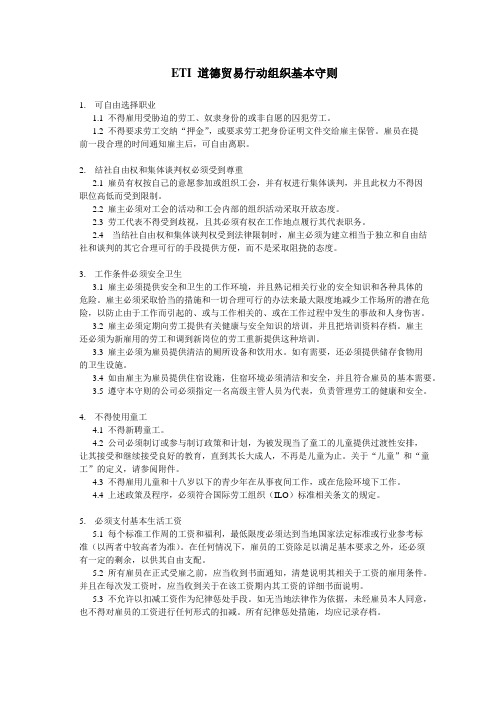
ETI 道德贸易行动组织基本守则1. 可自由选择职业1.1 不得雇用受胁迫的劳工、奴隶身份的或非自愿的囚犯劳工。
1.2 不得要求劳工交纳“押金”,或要求劳工把身份证明文件交给雇主保管。
雇员在提前一段合理的时间通知雇主后,可自由离职。
2. 结社自由权和集体谈判权必须受到尊重2.1 雇员有权按自己的意愿参加或组织工会,并有权进行集体谈判,并且此权力不得因职位高低而受到限制。
2.2 雇主必须对工会的活动和工会内部的组织活动采取开放态度。
2.3 劳工代表不得受到歧视,且其必须有权在工作地点履行其代表职务。
2.4 当结社自由权和集体谈判权受到法律限制时,雇主必须为建立相当于独立和自由结社和谈判的其它合理可行的手段提供方便,而不是采取阻挠的态度。
3. 工作条件必须安全卫生3.1 雇主必须提供安全和卫生的工作环境,并且熟记相关行业的安全知识和各种具体的危险。
雇主必须采取恰当的措施和一切合理可行的办法来最大限度地减少工作场所的潜在危险,以防止由于工作而引起的、或与工作相关的、或在工作过程中发生的事故和人身伤害。
3.2 雇主必须定期向劳工提供有关健康与安全知识的培训,并且把培训资料存档。
雇主还必须为新雇用的劳工和调到新岗位的劳工重新提供这种培训。
3.3 雇主必须为雇员提供清洁的厕所设备和饮用水。
如有需要,还必须提供储存食物用的卫生设施。
3.4 如由雇主为雇员提供住宿设施,住宿环境必须清洁和安全,并且符合雇员的基本需要。
3.5 遵守本守则的公司必须指定一名高级主管人员为代表,负责管理劳工的健康和安全。
4. 不得使用童工4.1 不得新聘童工。
4.2 公司必须制订或参与制订政策和计划,为被发现当了童工的儿童提供过渡性安排,让其接受和继续接受良好的教育,直到其长大成人,不再是儿童为止。
关于“儿童”和“童工”的定义,请参阅附件。
4.3 不得雇用儿童和十八岁以下的青少年在从事夜间工作,或在危险环境下工作。
4.4 上述政策及程序,必须符合国际劳工组织(ILO)标准相关条文的规定。
L2_ETI基本守则_中国法规_Tesco乐购守则

ETI 基本守则中国劳动与职业安全法规Tesco乐购守则(以下要求中,对同一事项的描述,请以Tesco乐购政策为首要标准,如果Tesco乐购政策未作出相关规定,请以ETI守则和法律规定两者中相对严格的要求为准。
)1.自由选择的雇佣关系1.1 不可使用强制劳动力、受关押劳动力和不情愿的犯人劳动力。
1.2 雇员不应被要求交纳抵押金或把他们的身份证件交给雇主,在给出合理的预先通知之后,雇员可以自由地离开其雇主。
法律规定:●不得扣押劳动者的居民身份证和其他证件,不得要求劳动者提供担保或者以其他名义向劳动者收取押金、财物。
●试用期劳动者解除合同提前3天通知雇主,试用期过后劳动者解除合同提前一个月通知雇主●用人单位应当在解除劳动合同时出具解除劳动合同证明,并在十五日内为劳动者办理档案和社会保险关系转移手续。
●非全日制用工可以随时通知用人单位终止工作。
2. 尊重结社自由和工会代表劳方进行劳资谈判的权力2.1 所有雇员毫无例外地具有加入或组成其自己选择的工会的权力和进行集体劳资谈判的权力。
2.2 雇主对于工会的行为和他们的组织活动,要采取开放的态度。
2.3 不能歧视职工代表,这些代表可以利用其工作场所执行其职工代表的职能。
2.4 在自由结社和劳资谈判的权力受法律限制的地方,雇主要促进而不是防碍建立独立自由的结社和劳资谈判的类似形式。
法律规定:●在中国境内以工资收入为主要生活来源的劳动者,都有依法参加和组织工会的权利。
任何组织和个人不得阻挠和限制。
工会依照法律规定通过职工代表大会或者其他形式,组织职工参与本单位的民主决策、民主管理和民主监督。
●工资集体协商,是指职工代表与企业代表依法就企业内部工资分配制度、工资分配形式、工资收入水平等事项进行平等协商,在协商一致的基础上签订工资协议的行为。
已订立集体合同的,工资协议作为集体合同的附件,并与集体合同具有同等效力。
●职工一方的协商代表由本单位工会选派。
未建立工会的,由本单位职工民主推荐,并经本单位半数以上职工同意。
什么是ETI验厂

什么是ETI验厂什么是ETI验厂?ETI (Ethical Trading Initiative) 是英国道德贸易组织的英文简称。
是由UK起草的一个议案,目的是通过设立针对在发展中国家采购公司社会责任的论坛以改善全球工人的工作条件。
ETI验厂就是客户或客户委托公证行对其所批准生产或准备建立合作伙伴关系的厂家所进行的检查与验收,以确保他们的合作伙伴符合他们的“行为准则”。
查验的内容主要包括公司证件数据、管理模式、员工人权、产品质量、反恐安全措施以及作业场所、生产设施、消防设备、生活设施、环境卫生、厂房建设、饮食娱乐等各方面。
) U7 u6 D# B$ ] b7 Y8 WETI由三方代表组成:公司、工会和非**组织。
ETI的基本守则与SA8000类似,都是基于联合国劳工组织基本协议。
ETI是由英国国际发展部和私人; B. i8 z* k/ U$ l6 G H( O$ C- t8 A2 M' b: V9 U部门出资赞助成立,正实行的几个首例审核促使最佳运作准则的形成。
参与ETI的公司和组织有:C&A,Sainsbury's,the Co-operative Wholesale Society和拯救儿童、公平贸易协会等非**机构。
% K4 m7 [/ i% k1 a6 p8 s* }ETI和SA8000的区别在于:SA8000是全球性的标准,而ETI主要是由英国公司组成;ETI目的是通过比较改善工人权益的不同方案来改善系统,而SA8000是可操作的认证系统。
无论SA8000或ETI都是在广泛咨询后形成的。
ETI认证内容1.有选择的雇佣关系+ O7 e; R* v7 d! _; ]! Z( D* Q* b j! K# H2.尊重结社自由和集体谈判的权力& N3 b1 j0 k* B5 |3 ?; Y* }4 N3.安全卫生的工作条件J* p0 Q/ i+ P4.不得使用童工0 O. h' f2 P' e5 T* J- }/ l5.生活工资+ w' J$ m9 h& s& U* B3 K6.不能超过工作时间7.禁止歧视1 x9 D2 A' h6 l0 R- J: c; v8 s8.正规的雇用关系6 q( W7 a( F. \: ~; V9 T6 _" u9.不得采用粗暴的或不人道的方式对待雇员8 Z D# J2 t6 FETI认证基本/法则自由选择职业3 ~" N3 f# }2 ^3 A1.1 不可雇用受强迫劳工﹐奴隶或非自愿的囚犯劳工。
ETI行为准则(中英文版)19

ETI行为准则(中英文版)19The ETI Base CodeAbout ETIFor 20 years, ETI and our members have been a driving force in ethical trade. We influence business to act responsibly and promote decent work. Together, we tackle the complex challenges of today’s global supply chains, improving the lives of workers worldwide. Taking a unique approach to business and human rights, our members are forward-thinking companies, trade unions and NGOs. By adoptin g ETI’s internationally recognised Base Code of labour standards, our members strive to keep workers safe and free from exploitation.Our members include:M ore than 80 global companies and well-known brands such as John Lewis/Waitrose, Marshalls, Inditex, Primark,Burberry and Stella McCartney. Publicsector organisations such as Transport forLondon and supplier companies includingFinlays, Li & Fung, Matrix and UnionHand-Roasted.U nion federations representing over 180 million workers worldwide via the TradesUnion Congress and the InternationalTrade Union Confederation, and throughthem, actively engaged affiliated unions.? N GOs operating in more than 40countries, including large charities likeSave the Children, CARE Internationaland Oxfam, as well as more specialisedorganisations such as Partner Africa, DalitSolidarity Network and HomeworkersWorldwide.About the ETI Base CodeThe ETI Base Code is founded on the conventions of the International Labour Organisation (ILO) and is an internationally recognised code of good labour practice.It is viewed as a global reference standard and is widely used as a benchmark against which to conduct social audits and develop ethical trade action plans.The provisions of the Base Code constitute minimum and not maximum standards. Companies applying this code are expectedto comply with national and other applicable laws. Where the law and the Base Code address the same subject, companies are expected to apply the provision that affords the greater protection to workers.All our members aspire to helping their suppliers meet all aspects of the Base Codein full and they commit to continuous improvement in pursuit of this goal. ETI exists to support them on this journey.Driving improvements in company supply chainsBy joining ETI, a company agrees to demonstrate a clear commitment to ethical trade, to integrate ethical trade into core business practices, and to tackle any issues that arise in the supply chain.As a first step, our member companies commit to the ETI Base Code and follow our principles of implementation, which guide their approach to ethical trade. Companies report to us annually on their efforts and the results they are achieving atfarm or factory level.We believe that deep-seated worker rights issues are best tackled through collaborative action. We harness the expertise, skills and resources of our alliance members to identify these issues and develop innovative, long-lasting solutions.There are limits to what companies can achieve by working alone. ETI members work in partnership to find solutions to the problems that occur in individual workplaces, but that also affect entire countries and industries. Peter McAllister –Executive Director, ETI1. Employment isfreely chosen4. Child labour shall not be used 7. No discrimination ispractised3. Working conditionsare safe and hygienic6. Working hours arenot excessive9. No harsh or inhumanetreatment is allowed 2. Freedom of associationand the right to collectivebargaining are respected5. Living wagesare paid8. Regular employment isprovided1Employment is freely chosen1.1 There is no forced, bonded or involuntary prison labour.1.2 W orkers are not required to lodge “deposits” or theiridentity papers with their employer and are free to leavetheir employer after reasonable notice.2F reedom of association and the right to collectivebargaining are respected2.1 W orkers, without distinction, have the right to join orform trade unions of their own choosing and to bargaincollectively.2.2 T he employer adopts an open attitude towards theactivities of trade unions and their organisationalactivities.2.3 W orkers representatives are not discriminated against andhave access to carry out their representative functions inthe workplace.2.4 W here the right to freedom of association and collectivebargaining is restricted under law, the employer facilitates, and does not hinder, the development of parallel meansfor independent and free association and bargaining.3Working conditions are safe and hygienic3.1 A safe and hygienic working environment shall beprovided, bearing in mind the prevailing knowledge of the industry and of any specific hazards. Adequate steps shallbe taken to prevent accidents and injury to health arisingout of, associated with, or occurring in the course of work, by minimising, so far as is reasonably practicable, thecauses of hazards inherent in the working environment.3.2 W orkers shall receive regular and recorded health andsafety training, and such training shall be repeated for new or reassigned workers.3.3 A ccess to clean toilet facilities and to potable water, and,if appropriate, sanitary facilities for food storage shall beprovided.3.4 A ccommodation, where provided, shall be clean, safe, andmeet the basic needs of the workers.3.5 T he company observing the code shall assignresponsibility for health and safety to a seniormanagement representative.4C hild labour shall not be used4.1 There shall be no new recruitment of child labour.4.2 C ompanies shall develop or participate in and contributeto policies and programmes which provide for thetransition of any child found to be performing child labour to enable her or him to attend and remain in qualityeducation until no longer a child; “child”and “childlabour” being defined in the appendices.4.3 C hildren and young persons under 18 shall not beemployed at night or in hazardous conditions.4.4 T hese policies and procedures shall conform to theprovisions of the relevant ILO standards.5Living wages are paid5.1 W ages and benefits paid for a standard working weekmeet, at a minimum, national legal standards or industrybenchmark standards, whichever is higher. In any eventwages should always be enough to meet basic needs andto provide some discretionary income.5.2 A ll workers shall be provided with written andunderstandable Information about their employmentconditions in respect to wages before they enter employment and about the particulars of their wages for the pay period concerned each time that they are paid. 5.3 D eductions from wages as a disciplinary measure shall not be permitted nor shall any deductions from wages not provided for by national law be permitted without the expressed permission of the worker concerned. All disciplinary measures should be recorded.。
eti 标准

ETI(Ethical Trading Initiative)是英国道德贸易组织的英文简称,它由英国国际发展部和私人部门出资赞助成立。
ETI的基本守则与SA8000类似,都是基于联合国劳工组织基本协议。
ETI验厂就是客户或客户委托公证行对其所批准生产或准备建立合作伙伴关系的厂家所进行的检查与验收,以确保他们的合作伙伴符合他们的“行为准则”。
ETI的会员公司应明确支持会员规章、基本守则及其执行程序,并委任一名高层管理人员具体负责法规的实施。
会员公司还要承诺不得采用粗暴的或不人道的方式对待雇员,并承担义务通报到全公司及其供应商和次级承包商(包括业务关系密切的自雇员工在内)。
同时,会员公司要指定一名高级主管为代表,负责执行守则,并将本守则及其执行程序,溶入主要商务关系和文化内。
公司须确保其人力与财力资源足以帮助其履行承诺。
ETI标准是一个涉及劳工权益、企业道德和可持续性的标准体系,旨在改善全球工人的工作条件。
如果您对ETI标准有进一步的疑问,建议您查询ETI官方网站获取更准确的信息。
ETI基本准则与中国在社会责任方面的法规要求

雇员不应被要求交纳抵押金或把他们的身份证件交给雇主, 雇员不应被要求交纳抵押金或把他们的身份证件交给雇主,在 给出合理的预先通知之后,雇员可以自由地离开其雇主。 给出合理的预先通知之后,雇员可以自由地离开其雇主。
Compliance Requirements 符合性关键点
• Original documents of employees should not be retained or without lodge deposit. For instance, ID cards etc. 公司不应保存员工相关证件原件或押金,如身份证等 公司不应保存员工相关证件原件或押金 如身份证等 • Employees should not have the relationship of large amount or long-term debit and credit on loan with the factory. 员工不应与公司有大额或长期借贷关系 • Freedom of movement of employees should not be restricted. 员工的行动自由不可被限制 • Employees should have the right to choose OT work 员工应有加班的自由选择权 • Employees are free to leave the factory 员工有辞工自由 • No prisoner or prison labor should be employed 公司不可使用囚犯或监狱工
ieee行为准则 -回复

ieee行为准则-回复IEEE行为准则的重要性及实践作为全球最大的专业技术组织之一,IEEE(电气和电子工程师学会)致力于推动技术的发展和应用,维护技术领域的专业道德和行业规范。
为了确保其成员始终遵守最高的行为准则,IEEE制定了行为准则,旨在指导其成员的职业和道德行为。
本文将逐步解析IEEE行为准则的重要性以及如何实践这些准则。
首先,我们来了解IEEE行为准则的重要性。
IEEE行为准则凸显了专业素养、道德操守和职业责任等方面,这些对于科技行业的从业者至关重要。
当科技发展迅猛时,我们面临着诸多伦理和道德议题,包括隐私保护、人工智能的应用、科技创新对社会和环境的影响等。
如何应对这些挑战并确保技术发展符合人类的利益,成为了科技从业者的重要责任。
IEEE行为准则提供了行动指南,使从业者能够在伦理和道德层面做出正确的决策,从而保障公众的利益。
然后,我们深入探讨IEEE行为准则的实践。
IEEE行为准则包括了八个主要方面,即有责任感、专业竞争力、诚信、尊重他人、发展自身能力、社会责任、管理资源的合理使用以及遵守法律和法规。
以下是一些具体的实践方法,来帮助从业者更好地履行这些准则。
首先,有责任感是IEEE行为准则的核心准则之一。
从业者应当始终保持对自己的行为负责,并将人类的利益放在首位。
他们应遵循透明度和公正的原则,确保他们的决策和行动不会对公众造成损害。
从业者可通过制定和遵守道德规范、参与社区和专业团体,以及积极采纳反馈意见等方式来实践这一准则。
其次,专业竞争力是从业者必须具备的素质之一。
他们应当不断提升自己的专业知识和技能,并积极参与学习和培训活动。
从业者可通过阅读专业文献、参加技术会议、持续学习新的技术和工具,以及与同行交流等方式来提升自己的专业水平。
诚信也是IEEE行为准则的重要要求之一。
从业者应当始终诚实守信,遵循商业道德和学术道德的原则。
他们不应隐瞒有关科技产品或服务的信息,不应从事欺诈、伪造数据或剽窃等不道德行为。
ETI行为准则

道德貿易聯盟目標,準則,工作內容及入會資料1998 年9 月目標工作準則道德貿易聯盟基本守則簡介守則實行準則工作內容入會資料監管與組織附件一︰相關國際標準附件二︰定義--------------------------------------------------------------------------------目標有越來越多的公司意識到﹐當他們將勞務守則運用在全球供應鏈的同時﹐為求效率與信用﹐它們自己也必須了解並向外界展示這項做法所達到的成果。
道德貿易聯盟是由商業機構、非政府組織及工會團體組成﹐共同致力於確認及推廣正確的勞務守則之運用﹐職責包括監督及獨立審查成員機構是否履行既定守則。
聯盟成員相信﹐透過這種集體式的做法﹐對提倡國際公認的勞工標準﹐有相當大的助益﹐尤其是在全球供應鏈中的基本人權方面。
本文列出了道德貿易聯盟的營運基準。
其要點如下︰聯盟的目標及工作以集體的力量﹐集結商業機構、工會組織及非政府組織﹐共同尋求推行貿易道德守則的最佳方式。
聯盟進行推廣工作時所依據的標準會員資格。
--------------------------------------------------------------------------------[首頁]工作道德貿易聯盟將與會員機構及其供應商合作﹐發展試驗計劃﹐以找出最有效的方法﹐使勞務守則成為有價值而可信的準則﹐其中又以監督與審查兩方面尤為重要。
聯盟的主要工作為進行試驗計劃﹐從中學習﹐並推廣相關經驗。
此外﹐道德貿易聯盟會參考個別公司、非政府組織、工會團體、國際機構等工作的相關經驗﹐以及此等組織的聯合行動。
道德貿易聯盟也會舉辦會議及研討會﹐進行研究﹐出版刊物﹐並致力培訓工作的發展。
雖然聯盟的基本工作為尋求有效方法﹐確保全球供應鏈上各環節尊重基本勞工權益﹐並監查會員的相關表現﹐但在適當的時侯﹐聯盟也會注意其會員之工作對人權及其所在地環境和發展等議題所帶來的廣泛影響。
- 1、下载文档前请自行甄别文档内容的完整性,平台不提供额外的编辑、内容补充、找答案等附加服务。
- 2、"仅部分预览"的文档,不可在线预览部分如存在完整性等问题,可反馈申请退款(可完整预览的文档不适用该条件!)。
- 3、如文档侵犯您的权益,请联系客服反馈,我们会尽快为您处理(人工客服工作时间:9:00-18:30)。
二、道德贸易联盟基本守则
1.
自由选择职业
1.1
不可雇用受强迫劳工﹐奴隶或非自愿的囚犯劳工。
1.2
不可要求劳工付〞押金〞﹐或将身份证明文件交予雇主保管。
雇员给予雇主合理的通知期后﹐可自由离职。
2.
尊重结社自由及集体谈判权
2.1
雇员有权按自己的意愿﹐参加或组织工会﹐并进行集体谈判。
同时﹐不可因此而受到不同待遇。
2.2
雇主须对工会的活动和会内之组织活动﹐采取开放态度。
2.3
劳工代表不可受到歧视﹐并可在工作地点执行代表的职务。
2.4
若结社自由和集体谈判权受法例限制﹐雇主须提供方便﹐协助发展相辅相成的渠道﹐而非采阻挠态度。
3.
工作环境安全卫生
3.1
雇主须提供安全、卫生的工作环境﹐并注意相关行业的工业安全知识及危险。
雇主须采取足够的措施﹐以合理可行的方法﹐尽量减少在工作地点的潜在危险﹐以避免雇员因执行勤务﹐在相关情况下或在执行勤务期间发生意外﹐引致健康受损。
3.2
雇主须定期提供有关健康与安全的培训﹐并将资料存盘。
此等培训应为新聘劳工或调任新职的劳工重新举办。
3.3
雇主须为雇员提供清洁的厕所设备和饮用水。
如有需要﹐亦须提供储存食物的卫生设备。
3.4
若雇主为雇员提供住宿﹐住宿环境必须清洁和安全﹐并符合雇员的基本需要。
3.5
遵循守则的公司须委任一高级主管为代表﹐负责劳工的健康及安全。
4.
不可雇用童工
4.1
不可招聘童工。
4.2
公司须制定参与及协助制定政策和计划﹐为被发现当上童工的儿童﹐提供过渡性的服务﹐使其接受良好教育﹐直至长大成人。
4.3
不可聘用十八岁以下儿童及青少年﹐在夜间或危险场所工作。
4.4
上述政策及程序﹐须与国际劳工组织标准的相关条文一致。
5.
基本生活工资
5.1
每个正常工作周的工资及福利﹐至少须达到当地的法定标准或业内的参考标准﹐并以较高者为主。
在任何情况下﹐雇员工资除应足以维持基本需求外﹐也应在此之上有所剩余﹐以供零用。
5.2
所有雇员在入职前应获发书面通知﹐清楚说明有关工资的聘用条件﹐并在每次发薪时﹐收到有关支薪期内工资的书面说明。
5.3
严禁以扣减工资作为纪律惩处﹐也不可在没有当地法律依据且未经雇员同意的情况下﹐扣减工资。
所有纪律惩处的办法﹐皆应记录存盘。
6.
工作时间不可过长
6.1
工时必须符合当地法律规定及业内参考标准﹐并以保障较大者为准。
6.2
在任合情况下﹐雇主不可定期要求雇员每周工作超过48小时﹐并雇员平均每7个连续工作天﹐须至少享有一天休假。
加班工作须属自愿性质﹐每周不可超过12小时﹐也不可视为常规安排.同时﹐应以较高额度之加班费做补偿。
7.
不可歧视雇员
7.1
雇员不可因种族、阶级、国籍、宗教、年龄、残障、性别、婚姻状态、性取向、工会会籍或政治倾向等因素﹐而在聘用、赔偿、培训、晋升、解聘或退休方面受到歧视。
8.
正常劳资关系
8.1
在所有情况下﹐雇员的工作必须以当地法律或惯例认可的劳资关系为基础。
8.2
不可利用仅供劳力合约、分包合约、家庭代工方式﹐或透过一些无意传授技能或提供正常劳资关系的学徒训练计划﹐或利用过期使用定期劳资合约, 来逃避雇主在劳工法或社会福利法规定下﹐因正常劳资关系而必须向雇员负担的责任。
9.
严禁以苛刻或不人道手法对待雇员
9.1
严禁雇员受到身体虐待或体罚﹐受到身体虐待的威胁﹐性骚扰﹐或其它形式的骚扰及言语上的侵犯或其它形式的恐吓。
本守则内的条文所列﹐仅为最低标准﹐而非最高要求﹐公司不应以此为限﹐而拒绝超越标准。
应用本守则的公司亦须遵守当地及其它适用的法律﹐若法律与本基本守则内的条文皆对同一事项做出规定﹐则须以保障较大者为准。
